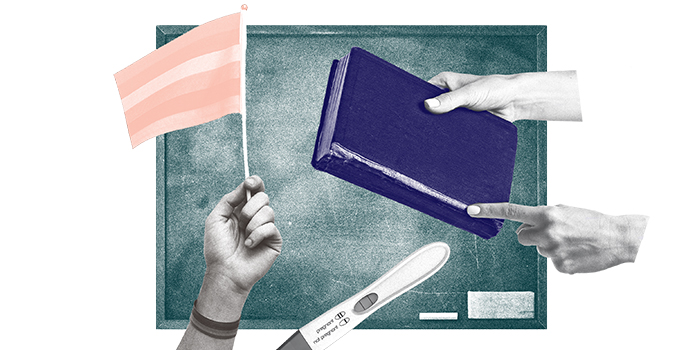Government Promotion of Religion
The ACLU works in courts, legislatures, and communities to defend and preserve the individual rights and liberties that the Constitution and the laws of the United States guarantee everyone in this country.

Stay informed about our latest work in Government Promotion of Religion.
By completing this form, I agree to receive occasional emails per the terms of the ACLU's privacy statement.
The Latest


Oklahoma Supreme Court blocks Superintendent Ryan Walters’ attempts to purchase Bibles and Bible-infused instructional materials


Supreme Court to Hear Oklahoma Case Involving Nation’s First Religious Public Charter School


Civil Liberties Organizations Unite to Oppose Oklahoma Education Superintendent Ryan Walters’ Latest Push for Religion in Public Schools


Court Blocks Louisiana Law Requiring Public Schools to Display Ten Commandments in Every Classroom
Explore More
What We're Focused On

Celebrating Christmas in America
The ACLU works in courts, legislatures, and communities to defend and preserve the individual rights and liberties that the Constitution and the laws of the United States guarantee everyone in this country.

Government Funding of Religion
The ACLU works in courts, legislatures, and communities to defend and preserve the individual rights and liberties that the Constitution and the laws of the United States guarantee everyone in this country.

Legislative and Government Prayer
The ACLU works in courts, legislatures, and communities to defend and preserve the individual rights and liberties that the Constitution and the laws of the United States guarantee everyone in this country.

Religious Displays by the Government
The ACLU works in courts, legislatures, and communities to defend and preserve the individual rights and liberties that the Constitution and the laws of the United States guarantee everyone in this country.
What's at Stake
Religious freedom is not only one of our most treasured liberties, but it is also a fundamental human right and a defining feature of our national character. Given this nation’s robust, longstanding commitment to freedom of religion and belief, it is no surprise that the United States is among the most religious and religiously diverse nations in the world. Indeed, religious liberty is alive and well in this country precisely because our government cannot tell us whether, when, where, or how to worship, and because our government cannot take sides on matters of faith.
Recognizing the importance of religious freedom, our founders set forth the Establishment Clause as the very first freedom enshrined in the First Amendment to the U.S. Constitution. It is a guarantee that the government will neither prefer religion over non-religion nor favor particular faiths over others.
Unfortunately, the government sometimes strays from this ideal by, for example, using taxpayer dollars to support religious activities, erecting religious symbols on government land, or discriminating on the basis of religion in government programs. These actions violate the Establishment Clause, which recognizes that religious freedom thrives best when the government stays out of it. Matters of religious belief should be left to individuals and faith communities, not to governments or political majorities.
Religious freedom is not only one of our most treasured liberties, but it is also a fundamental human right and a defining feature of our national character. Given this nation’s robust, longstanding commitment to freedom of religion and belief, it is no surprise that the United States is among the most religious and religiously diverse nations in the world. Indeed, religious liberty is alive and well in this country precisely because our government cannot tell us whether, when, where, or how to worship, and because our government cannot take sides on matters of faith.
Recognizing the importance of religious freedom, our founders set forth the Establishment Clause as the very first freedom enshrined in the First Amendment to the U.S. Constitution. It is a guarantee that the government will neither prefer religion over non-religion nor favor particular faiths over others.
Unfortunately, the government sometimes strays from this ideal by, for example, using taxpayer dollars to support religious activities, erecting religious symbols on government land, or discriminating on the basis of religion in government programs. These actions violate the Establishment Clause, which recognizes that religious freedom thrives best when the government stays out of it. Matters of religious belief should be left to individuals and faith communities, not to governments or political majorities.